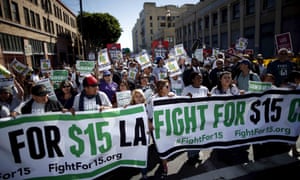California governor announces landmark $15 minimum wage deal
In a victory for the ‘Fight for $15’ campaign the proposed deal would give the state the highest minimum wage in the world, but the plan is not without critics
California governor Jerry Brown has announced a deal to raise the state minimum wage to $15 per hour by 2022, marking the largest victory to date of the national“Fight for $15” campaign to raise pay for low-income workers.
 Under the terms of the proposal, the state minimum wage, which is currently $10.00, will increase by $0.50 per year for two years, and then $1 per year for four years, until it reaches $15 in 2022. Beginning in 2024, the wage will be indexed to inflation. The deal also includes paid sick days, which will be phased in over time, according to a source with knowledge of the proposal.
Under the terms of the proposal, the state minimum wage, which is currently $10.00, will increase by $0.50 per year for two years, and then $1 per year for four years, until it reaches $15 in 2022. Beginning in 2024, the wage will be indexed to inflation. The deal also includes paid sick days, which will be phased in over time, according to a source with knowledge of the proposal.
California is the eight-largest economy in the world, and the proposed increase would give it the highest minimum wage in the world. Australia’s AUD $17.29 (US $13.04) is currently the highest national minimum wage.
“The Fight for $15 is winning historic changes no one would have thought possible just a few years ago,” said Christine Owens, executive director of the National Employment Law Project, in a statement. “California’s $15 minimum wage will mean big raises for more than 1 in 3 workers in the state, reversing years of falling pay.”
Though the federal minimum wage in the US has languished at $7.25 since 2009, many cities and states have moved to enact higher labor standards, including San Francisco, Los Angeles, and other California municipalities.
On 2 March, Oregon enacted a tiered minimum wage law that would raise pay to $14.75 in Portland, the state’s largest city, by 2022. New York is also reportedly nearing a deal to increase the state minimum wage to $15, and New Jersey legislators may seek a constitutional amendment to increase the state minimum wage if Republican governor Chris Christie vetoes a $15 per hour.
In November 2012, fast food workers in New York City went on strike to demand $15 per hour wages, touching off a national campaign for increased wages that has seen waves of one-day strikes by restaurant, airport, Walmart, home-care, and other workers across the country. The national campaign has received financial and organizing support from the Service Employees International Union.
According to Ken Jacobs, chair of the UC Berkeley Labor Center, the new statewide deal means that over six million workers in California are on track to earn $15 per hour by 2022, though some will achieve that benchmark earlier, due to local regulations.
Minimum wage increases have long been opposed by business interests. California Consumers Against Higher Prices (CCAHP), a coalition that includes the California Restaurant Association and the California Chamber of Commerce, formed in early March to oppose a proposed ballot initiative that would have also sought to increase the minimum wage to $15 per hour.
In a statement, CCAHP called the minimum wage plan “overreaching” and said it would have “devastating impacts ... on [voters] lives from education cuts, increased costs to seniors, services for the disabled, and the small businesses and jobs in their neighborhood.”
“It is imperative that lawmakers listen to the voices of their constituents and think about the well-being of their districts before bowing to the will of special interest groups,” the group said.
But Jacobs argued that any negative impacts of minimum wages are offset.
“Higher wages are a benefit to firms because they create a market for their products. We estimate that the impacts on the economy will be very small and the benefit for workers will be very big,” he said.
Jacobs also dismissed concerns that businesses will move jobs out of California.
“We’ve had big wage differentials between California and Texas for a long time,” he said. “But Silicon Valley is still happening here.”
No comments:
Post a Comment